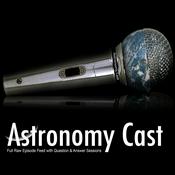Streamed live on Feb 13, 2026.
Modern astronomy has found that the Universe can surprise us. Here’s one which astronomers have called Luminous Fast Blue Optical Transients. They’re kinda like supernovas, they’re kind of like gamma ray bursts, but they’re not like them. So what are they? In the distant Universe, are blue light flashes, bright and hard to understand. These objects, uncreatively named "Luminous Fast Blue Optical Transients," are just the kind of puzzle astronomers love. In this episode, we look at their discovery and our current understanding of what they might be.
Image credit: NASA, ESA, NSF’s NOIRLab, Mark Garlick, Mahdi Zamani
This show is supported through people like you on Patreon.com/AstronomyCast
In this episode, we'd like to thank: Burry Gowen, Eric Lee, Jeanette Wink, Michael Purcell, Andrew Poelstra, David, David Rossetter, Ed, Gerhard Schwarzer, Jason Kwong, Joe McTee, Sergey Manouilov, Siggi Kemmler, Sergio Sancevero



